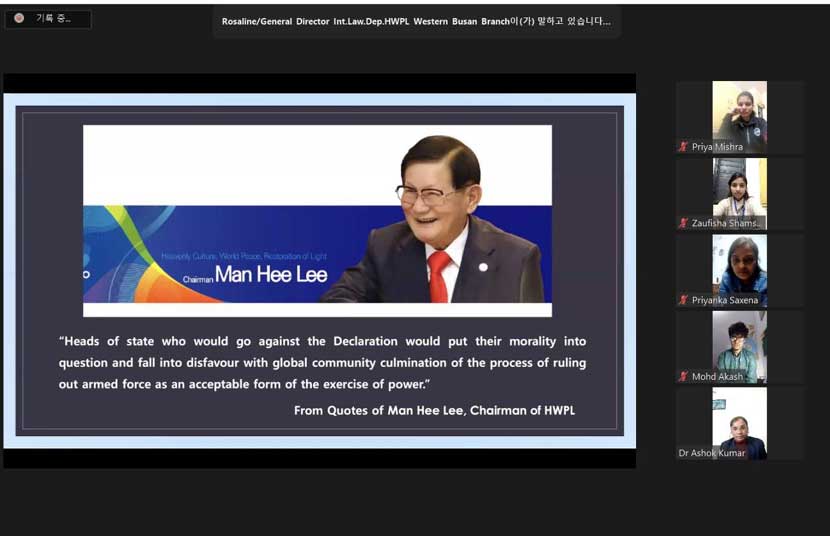২৭ এপ্রিল ২০২১ মঙ্গলবার, ০১:৫৫ পিএম
Desk report
শেয়ার বিজনেস24.কম
 |
The "DPCW Handbook Discussion Project" has been conducting the Empowerment Through Law of the Common People (ELCOP) in Bangladesh, and Mahatma Jyotiba Phule Rohilkhand University (M.J.P. Rohilkhand University) in India with 10 law experts and 34 law students since last November and February. It is the main purpose is to help law students and citizens around the world understand the value and spirit of peace through the DPCW curriculum and contribute to peace realization by developing international norms for the end of war and global peace. This project is being carried out by law students not only in Afghanistan, Tunisia, Romania and around the world, but also Bangladesh and India.
The Declaration of Peace and Cessation of War (DPCW) was drafted by international law experts in order to improve the limits of current international law as well as legal norms on the eradication of the use of force and the guarantee of international peace on 14 March 2016 in the form of a Preamble, 10 articles and 38 clauses. Last March, the 5th Annual Commemoration of the DPCW was held and joined by 132 countries from all sectors of the society including government, international organizations, heads of women and youth groups, religious leaders, press, and members of civic society.
The project is a way for law students to discuss and present one clause of DPCW in groups for about an hour to two hours, and the law experts will comment. They were divided into 5 groups from Bangladesh’s law students and discussed about Article 6 of the DPCW in each group. Article 6 of the DPCW is a clause closely related to recent Myanmar issues due to the resolution of international disputes through a peaceful way. In one of the groups voiced that It has the potential to faithfully enforce the jurisdiction or judgment of the International Court of Justice. In another group made opinions including that It makes additional proposals that emphasize resolving international disputes through peaceful means.
Dr. Masum Billah, Director of Human Rights Summer School, ELCOP, and Assistant Professor of Jagannath University made a comment in Article 7 of the DPCW’s discussion, “I hope the DPCW handbook discussion project will serve as an opportunity for students to grow mentally. Communicating and cooperating with each other in the process of preparing for the project is a truly valuable time, so I hope that the rest of the time will be in a peace and harmony attitude."
Dr. Ashok Kumar, Faculty Member, Faculty of Legal Studies, Mahatma Jyotiba Phule Rohilkhand University in India, said “The DPCW project will promote peace around the world. I think this opportunity will allow students to analyze and examine effective laws for peace.”
Through this project, law students are expected to be lawyers who comprehend that peace should be maintained so that humankind can enjoy it permanently not only in their own country but also in the whole world. And they will introduce and educate the DPCW curriculum to the young in their country.
শেয়ারবিজনেস24.কম এ প্রকাশিত/প্রচারিত সংবাদ, তথ্য, ছবি, ভিডিওচিত্র, অডিও কনটেন্ট বিনা অনুমতিতে ব্যবহার বেআইনি।